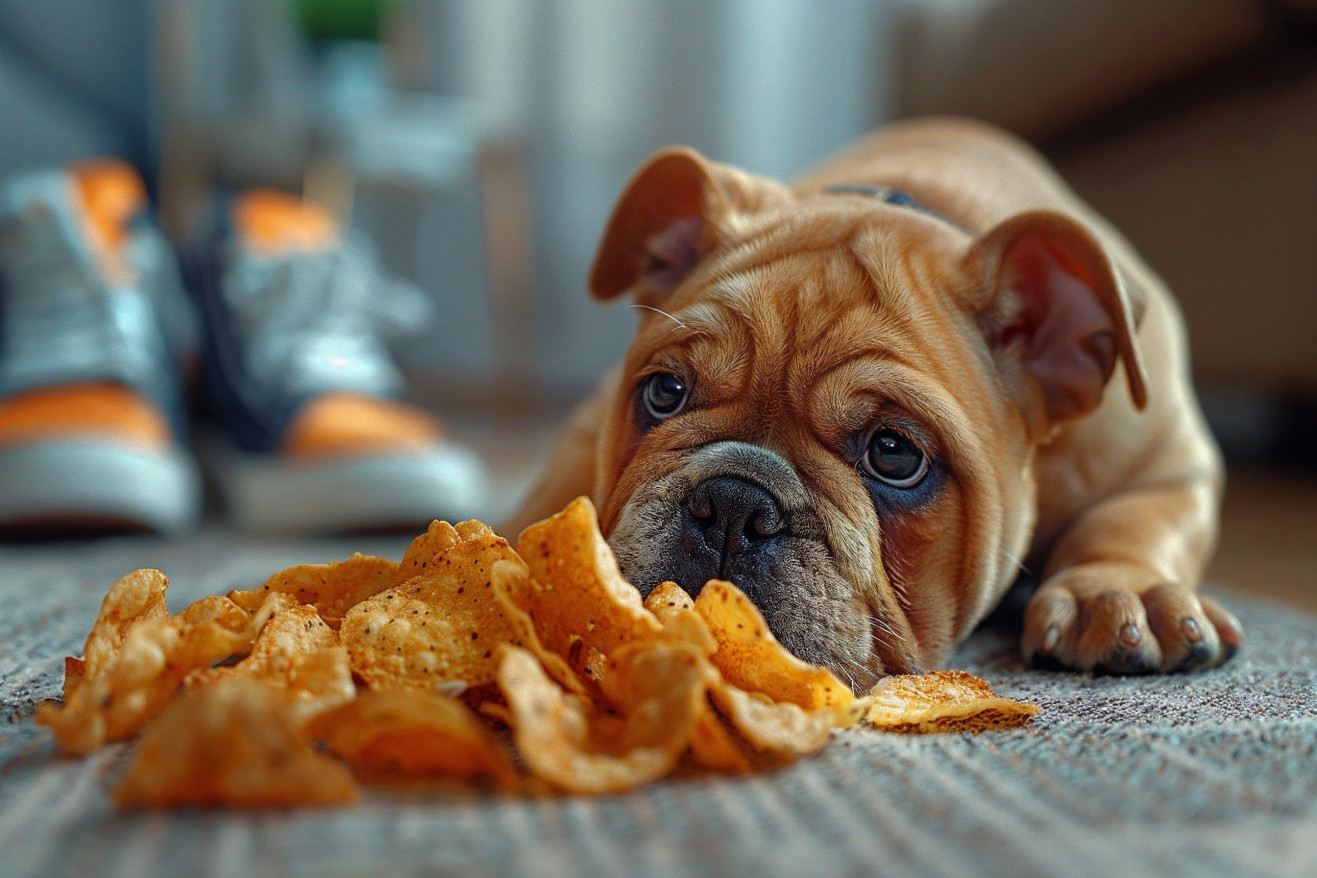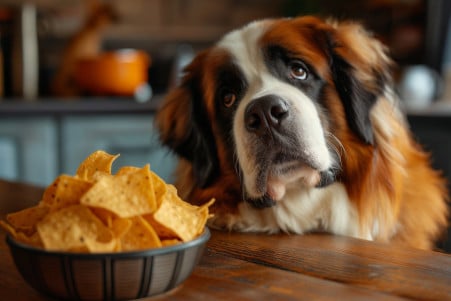Don't Give Your Dog Potato Chips: Here's Why
24 April 2024 • Updated 23 April 2024

While it might be tempting to share your favorite snack with your dog, the high fat and salt content in potato chips can cause some serious health problems for your furry friend. Not only do they not offer any nutritional benefits, but they can also cause vomiting and diarrhea when consumed in large amounts and even contribute to obesity and pancreatitis because of their high fat content.
Even though you might be tempted to give your dog a chip or two when you're snacking, this article will cover the research on why potato chips are not a good idea as a dog treat. By referencing veterinary medicine and animal nutrition experts, we'll cover the potential dangers and side effects of potato chips and how they can impact your dog's health.
Can dogs eat potato chips?
More Human Foods That Are Poisonous to Dogs
In addition to the items listed above, there are many other human foods that can be harmful or toxic to dogs. The ASPCA warns that chocolate, onions, garlic, grapes, raisins, macadamia nuts, and products with xylitol can be toxic to dogs. Signs of food toxicity can include vomiting, diarrhea, lethargy, ataxia (loss of coordination), seizures, and in some cases, organ failure and death.
The Pets Best blog lists other dangerous foods including alcohol, caffeine, fatty meats, nutmeg, raw dough, raw meat, and moldy foods that dog owners should avoid feeding their pets. Meanwhile, the GoodRx article also points out that avocados, cherries, and rhubarb can be harmful to dogs.
Given the many potential dangers in human food, it’s important for dog owners to be aware of these risks and take steps to avoid them. If you’re ever unsure about whether a particular food is safe for your dog, it’s best to ask your vet before giving your pet any human food as a treat. This can help you avoid accidental exposure to toxic substances and the potentially life-threatening medical issues that can result.
Risks of Salt Poisoning in Dogs
Salt poisoning, or sodium toxicosis, is a potentially life-threatening condition that occurs when dogs consume too much salt. According to PetMD, symptoms of salt poisoning include vomiting, diarrhea, lethargy, lack of coordination, seizures, and even coma. Ethos Veterinary Health explains that salt toxicity can result from eating high-sodium foods like chips or ingesting rock salt.
The Vetster article says that salt poisoning is a medical emergency and can be fatal if not treated. To prevent salt poisoning, the American Kennel Club recommends keeping salty snacks out of reach and making sure dogs have access to water, which can make the effects of salt poisoning worse if dogs are dehydrated.
What to Do If Your Dog Eats Potato Chips
If your dog eats potato chips, it's important to watch them for any signs of distress or illness. As the WebMD slideshow notes, vomiting, diarrhea, lethargy, tremors, fever, and seizures are all signs of salt poisoning or other problems caused by the high salt and fat content in the chips.
The Heart + Paw article suggests calling your vet if you notice any of these symptoms. It's also important to make sure you have the pet poison control hotline number (888-426-4435) on hand. You may also need to know how much your dog ate and what was in the chips.
As the Dogster article explains, salt toxicity from eating potato chips can have serious consequences if it's not treated. However, if you act quickly and get your dog to the vet, you can help ensure that they don't suffer any long-term or fatal effects.
Healthy Alternatives to Potato Chips for Dogs
Instead of sharing your potato chips with your dog, you can give them some healthy treats that are safe for them to eat. According to the Hot Dog on a Leash blog, some of the best options are fruits and veggies like carrot sticks, cucumber slices, or apple slices without seeds. The Honest Kitchen also lists raw organic cucumbers, blueberries, snap peas, and celery as some of the best dog-friendly snacks.
If you're shopping for dog treats at the store, the Honest Kitchen article recommends looking for treats that are high in protein and fiber and low in carbs. That said, you should always steer clear of any treats that contain toxic ingredients like xylitol, grapes, raisins, or macadamia nuts.
As the Daily Paws article explains, it's important to watch your dog closely whenever you give them a new food and to talk to your vet if you have any concerns. After all, every dog will react differently to different human foods.
Conclusion: Make Your Dog's Health a Priority
While it might be tempting to give your dog a salty snack like potato chips, the high fat and salt content in chips can lead to a number of health problems for dogs. Not only do potato chips lack nutritional value for dogs, but they can also cause vomiting and diarrhea in large quantities and contribute to obesity and pancreatitis because of their fat content.
In addition to potato chips, many other common human foods can be harmful or toxic to dogs. According to the ASPCA, chocolate, onions, garlic, grapes, raisins, macadamia nuts, and products containing xylitol are just a few of the foods that can be toxic to dogs. Signs of food toxicity in dogs can include vomiting, diarrhea, lethargy, lack of coordination, seizures, and in some cases, organ failure and death.
Salt poisoning, also known as sodium toxicosis, is a potentially life-threatening condition that occurs when dogs ingest too much salt. According to PetMD, symptoms of salt poisoning in dogs include vomiting, diarrhea, lethargy, lack of coordination, seizures, and in severe cases, coma. Ethos Veterinary Health notes that salt poisoning can result from the ingestion of salty foods like chips or rock salt.
If your dog eats potato chips, it's important to keep an eye on them for any signs of distress or illness. According to the WebMD slideshow, symptoms such as vomiting, diarrhea, lethargy, tremors, fever, and seizures could be signs of salt poisoning or other issues related to the high salt and fat content in the chips.
Instead of giving your dog potato chips, consider giving them healthy treats that are made specifically for dogs. According to the Hot Dog on a Leash blog, some safe options include carrot sticks, cucumber slices, and apple slices without seeds. The Honest Kitchen also recommends raw organic cucumbers, blueberries, snap peas, and celery as healthy treats for dogs. If you have any questions about your dog's diet or nutritional needs, talk to your veterinarian.


